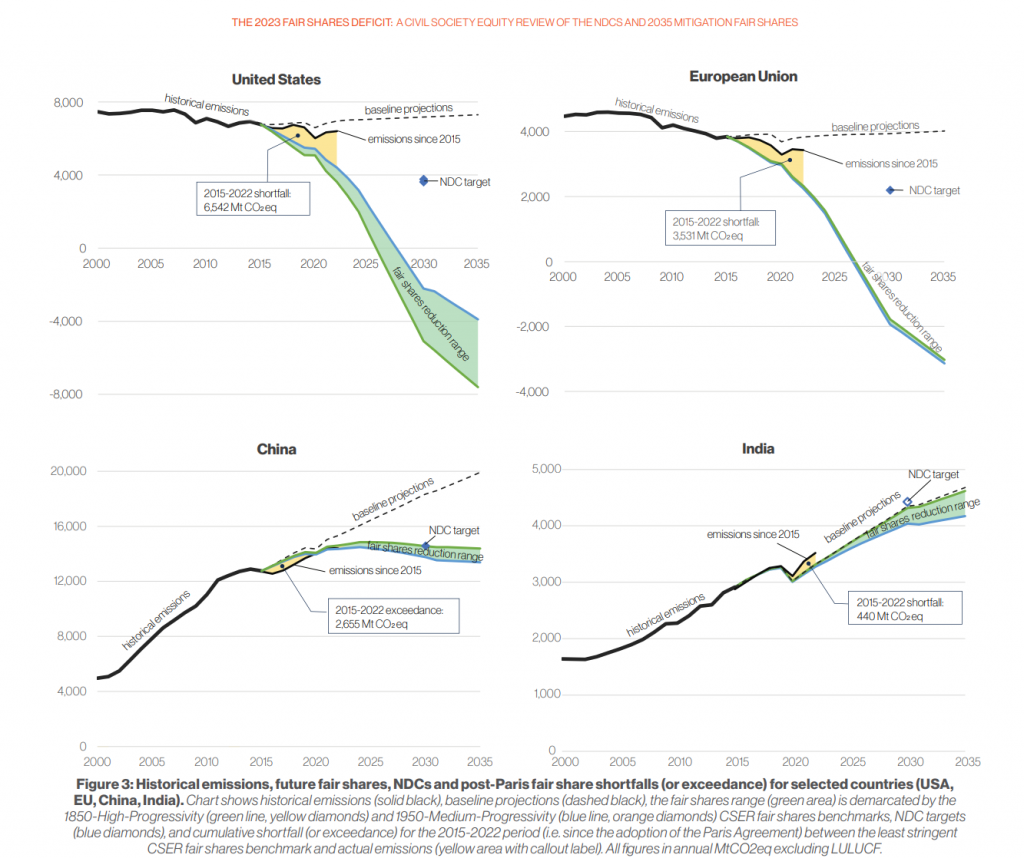US, UK, EU, Japan, and Australia must more than double NDC ambition to reach lower end of their fair share
Canada, the United States (US), Norway, Australia, and the United Kingdom (UK) must end fossil fuel extraction by the very early 2030s, according to a new report released at the 28th Conference of Parties (COP28) to the United Nations Framework Convention on Climate Change being held in Dubai, United Arab Emirates.
Further, the developed world is not meeting its “fair share” of emissions reductions in their Nationally Determined Contributions (NDC), noted the report titled Equitable Phaseout of Fossil Fuel Extraction released by the Civil Society Equity Review, endorsed by over 200 civil society organisations and social movements.
The US, UK, European Union, Japan and Australia need to more than double the ambition stated in their NDC to achieve even the lower end of their fair share, the findings showed.

“Fair shares are not only a moral priority but a practical and pragmatic one. Today’s report shows how far the US is still falling. We must hold the US and other rich developed countries accountable for doing their fair share. Continued failure to do so is a disaster for frontline communities,” Kelly Stone, senior policy analyst at ActionAid USA, said in a statement.
A country’s fair share is calculated based on capacity or financial resources above and beyond what is needed to sustain a decent standard of living and responsibility in terms of its cumulative historic emissions contributing to the climate crisis.
Presently, the collective ambition still falls significantly short of the goal of limiting temperature rise to 1.5degrees Celsius above the pre-industrial era. Further, the 2023 Production Gap Report highlighted that companies and countries are now on track to extract more than twice as much fossil fuel in 2030 as would be consistent with 1.5°C pathways.
The shortfall between fair share and actual emissions for the US in 2015-2022 was 6.5 gigatonnes of excess emissions above its fair share of mitigation, Ceecee Holz, senior research associate at the Climate Equity Reference Project and the executive director of the Climate Equity Reference Project Canada, said in a press briefing.
For comparison, the shortfall in India was found to be only 400 megatonnes in 2015-2022 despite its much larger population, the expert added.
The report calculated the phase out timeline for each country based on its dependence on fossil fuels. For example, countries with lower-than-average dependence were assigned faster phase-out rates, while those with higher-than-average dependence were given slower rates.
The phase out date, according to the findings, reflect the year in which production has declined by 90 per cent compared to 2023 levels.
However, providing different phase out timelines alone will not suffice. Wealthy countries, the report stated, should provide international financial support. “Countries with above-average capacity should provide hundreds of billions of dollars per year to lower-capacity countries to make their transitions possible,” read the report.
Their analysis showed that the UK, for example, should phase out coal by 2030 and end oil as well as gas extraction by 2031. The country should also provide 3.8 per cent of the required global support.
For the United States, the phase out timeline was 2031 for coal, oil, and gas. Its fair share of support was calculated to be 46.3 per cent, amounting to $97.1 billion. Both the UK and the US have a low dependence and high capacity.
Countries with high dependence and high capacity, such as Kuwait and Saudi Arabia, should phase out extraction in 2037 and 2041 and provide a fair share of support of 0.4 per cent and 1.5 per cent, respectively. These economies need time to restructure their economies, the report highlighted.
As for India, the country should aim to phase out oil, coal, and gas by 2031, 2036, and 2031, respectively. “Since their dependence [India, Tunisia, and Peru] is relatively low, they should aim for a rapid transition by the early 2030s, but given their low capacity, this can only happen if they receive sufficient support,” the report read.
These findings should guide climate negotiations, including the Global Stocktake, which will take stock of ambition and set expectations for realigning ambition and action in this critical decade, Shirley Matheson, NDC Enhancement Lead at the World Wide Fund for Nature, explained in a statement.
We are a voice to you; you have been a support to us. Together we build journalism that is independent, credible and fearless. You can further help us by making a donation. This will mean a lot for our ability to bring you news, perspectives and analysis from the ground so that we can make change together.




















































